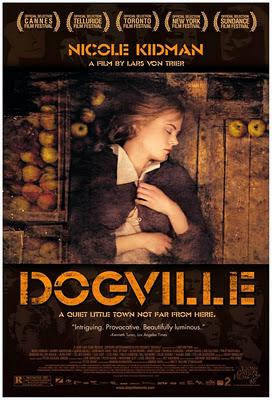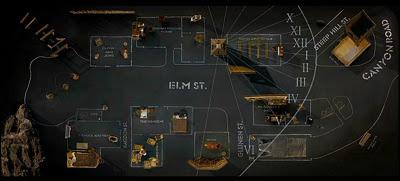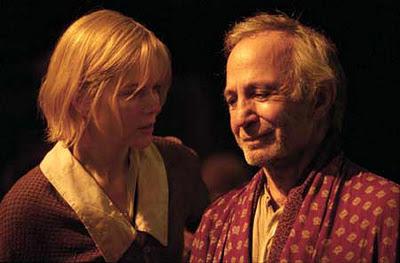
Dogville (2003)Dir./ Writer: Lars von Trier★ Nicole Kidman, Nicole Bacall, Chloe Sevigny, Paul Bettany
Before I saw DOGVILLE, I knew what minimalism looked like in paintings and pictures, in architecture, furniture and fashion. But minimalism in films I hadn't fully understood yet. How can you make a minimalistic film? Cut all side plots, cut most of the dialogue, reduce it to one or two characters? I had seen the second suggestion in VALHALLA RISING, the only Mads Mikkelsen film I haven't been able to like – which, let me tell you, is very uncommon. I don't know if that film was minimalistic, though, and I didn't know that DOGVILLE was. Until I watched it. Already in the first minutes I realized it was different, and a few minutes later I knew how it was different. It was minimalistic, and I was crazy about it.
Telling the story of ever-fighting good and evil and everything in between on hand of a small American village, DOGVILLE is a blend of not only countless genres but also the three most important arts of story-telling; literature, theater and film.
The first is the most subtle one in this film, however this is where much of its humor is hidden and also much of its brilliancy. Much like a novel, the film is divided into chapters, 9 of the kind, and a prologue. The time spans of the chapters vary, and each chapter is announced along with one short “in which...”-sentence that reveals just a tiny bit of the following sequence, so that your curiosity is constantly renewed. This must be one of the reasons why the running time of 178 minutes didn't bother me at all. To be able to novel-ize a film, one needs of course a narrator, which already brings us closer to the theatre-level, and the choice of the narrator has been nothing less but perfect. He really sounds like one of those Irish or Scottish story tellers with the rolling 'r' and that beautiful language melody. He wouldn't be anywhere as good, though, without the wonderful dialog that is also kept fluffily old-fashioned, if that expression makes any sense.

Also most of the minimalism has to do with the theatre-level. Like in a theatre, there's only one big room, and a few theatre-lights, though of course the film-”room” wouldn't fit into a theater as it includes a whole village. The special thing about this room is, that there are no walls. Yes, nada, niente, no walls, a village of a dozen houses without walls. And that is so ingenious for countless reasons. The most obvious reason I can think of is that you can see into the houses which is extremely interesting in many scenes, and that you can overlook the whole village in one shot from above. It must also have kept the production cost extremely low – the only thing that might have been expensive in this film are some of the actors. Wonderful and very interesting is also, how after 15 minutes or so, you start imagining the surroundings yourself, which proves that: no, you don't need locations, you don't even need walls to make a decent film. Or a great one, as it turns out. Everything it takes is a story that double fries your brains combined with performances that double fry your brain, and a team that is determined to double fry your brains.
I think you get the point that my brains felt very warm after watching DOGVILLE.
The minimalism also has some funny aspects to it by the way, but again: I don't want to spoil it for you.

Few films I've seen have been as unpredictable as DOGVILLE. In many films, especially horror films and B-movies, the characters undergo an extreme change from good to evil or inverted, but I've never seen it as well-made and as realistic and subtle, as in DOGVILLE. It is shocking, just shocking and I actually found myself crying in one scene, which really surprised me because it was so unexpected. Now, Kidman's character is the one that is developed least, but somehow it still does develop, even though it's hard to say in what way, especially without spoiling the film for you. She's the “good” one, the heroine, the one we have to feel pity for, yet at times I was mad at her, because she tried to feel pity for the villagers – and at the same time I did feel pity for those monsters.
There are so many things I want to tell you about this film – how much I loved the music, every actor from Paul Bettany to Chloe Sevigny, how much it enchanted me, how much it made me suffer...
But in the end, I might just as well tell you, how much I am in awe of this film, and how much I want you to watch it.
Rating: 9.8
(Yes, it's that good).

